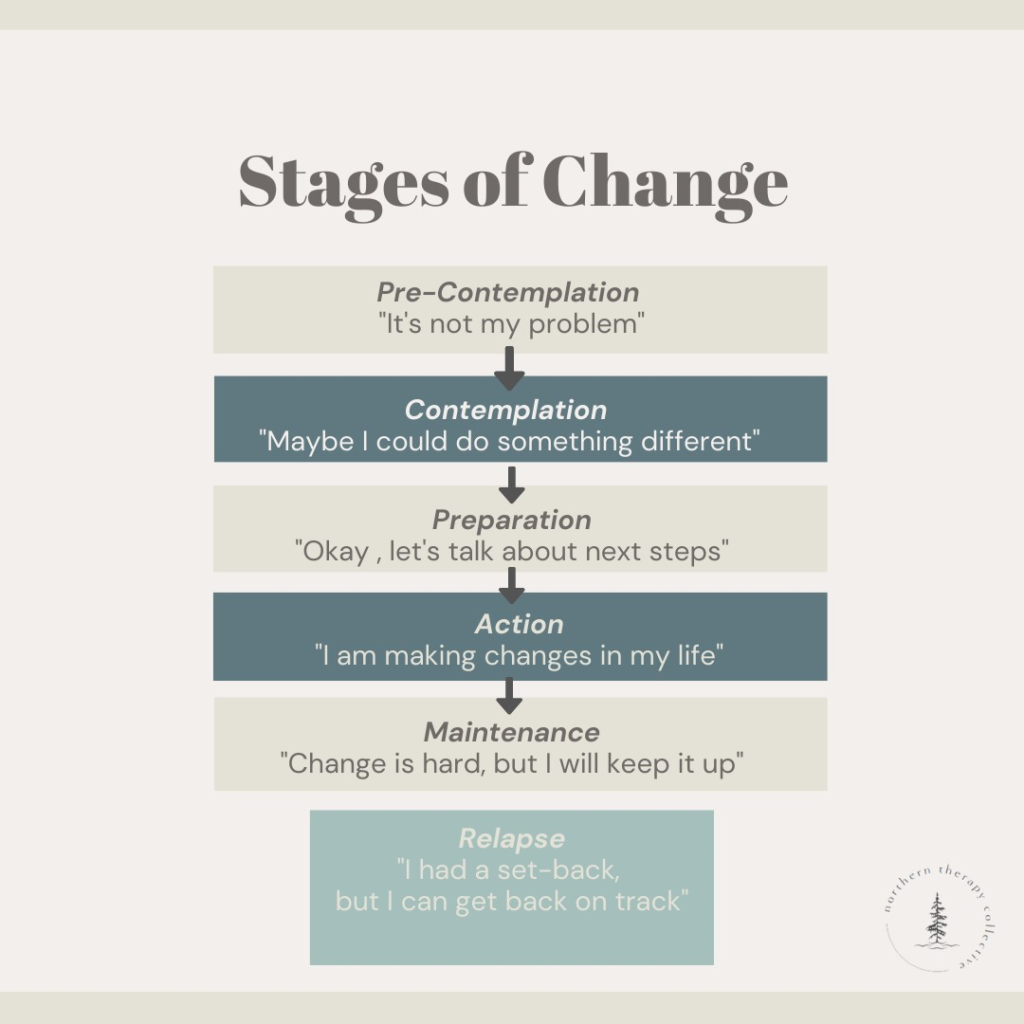Understanding the “Stages of Change” Model
Making behavioral change is a complex process for human beings. This complexity has made “change” a fascinating area of focus for psychologists and researchers for decades now. Psychologists James Prochaska and Carlo DiClemente developed the infamous “Stages of Change” model (a behavioral model of change) in 1983 when exploring smoking cessation studies. They developed this model to better help us understand how we move towards taking action and making changes in our lives. While the model was originally applied to addictions behaviors, it has since become widely popular in the world of therapy for anyone seeking to make behavioral changes in any area of life.

Let’s explore the 5 stages of change:
(1) Pre-Contemplation
- Often in this stage individuals are not aware of their problematic behaviors. They often make excuses or cover up problems, but truly are not in a state of readiness to tackle the problems they face.
- If folks in this stage end up in therapy, it’s often because they’re being pushed into it (due to a court order, probation, or maybe a loved one giving an ultimatum – either you seek help, or else the relationship will end).
- This stage can come with denial, anger, frustration, but most importantly: RESISTANCE to change.
(2) Contemplation
- Individuals in this stage may begin contemplating the idea of change. They start to consider how change may benefit them.
- Don’t get it confused though: usually in this stage you’re not quite ready to actually make the change. You are just more curious about your behaviors and begin building awareness of how change could maybe benefit you.
- This stage comes with perhaps a bit of guilt (for the behaviors that you are now owning).
(3) Preparation
- This stage is where (small) changes start. Individuals may start making small commitments to change, and taking the first steps towards their new goals.
- Although the dance with change may be inconsistent at this stage, there is a commitment to at least take small steps forward and try something new.
(4) Action
- And now we are on our way – in the Action Stage, change is happening. Individuals are developing plans and goals, and attempting new behaviors in place of old ones.
- There is a readiness here, a commitment. If you are in this stage, you are actively making changes and trying out new ways of behaving to support reaching your goals.
(5) Maintenance
- This stage happens after several months of hard work adopting new behaviors. This is where individuals have truly made changes in their lives, that have resulted in different (desired) outcomes.
- The maintenance stage is about maintaining all the hard work you have done along the way

The Unofficial 6th Stage: Relapse
Since the model was first developed there has been an unofficial inclusion of a 6th stage of change: Relapse.
This stage is a beautiful nod to the fact that lapsing back to old behaviors is perfectly normal, and is actually to be expected. Remember: Old habits die hard. You are bound to fall back to old ways from time to time (we all do). This unofficial stage of change is really meant to normalize that type of slip back, and to remind folks that they can get back where they were with a recommitment to the changes you worked so hard to make. These set-backs can easily be resolved by realigning with your goals, creating an action plan, and getting back to the new behaviors you’ve worked so hard to learn.
Consider Your Relationship with Change
Change is really incredible. It is a privilege to be in a profession where we get to witness people make beautiful changes every day for themselves (seriously, it’s so incredible). The amount of dedication and commitment it takes to let go of old ways, and learn new ones, is not a light load. We’d like to invite you to consider your relationship with “change”. Consider where you are in relation to the model explored here and making a change in your own life towards a desired goal or new way of being.
And don’t forget: help is always there. Reach out to a therapist or mental health professional if you’re contemplating making a change that requires guidance and support. Change is not easy, it takes time, and you can do it.
REFERENCE: Yeshiva University, Blog (2021). Prochaska and DiClemente’s stages of change model for social workers. Retrieved from: https://online.yu.edu/wurzweiler/blog/prochaska-and-diclementes-stages-of-change-model-for-social-workers#:~:text=During%20a%20smoking%20cessation%20study,also%20known%20simply%20as%20TTM.





